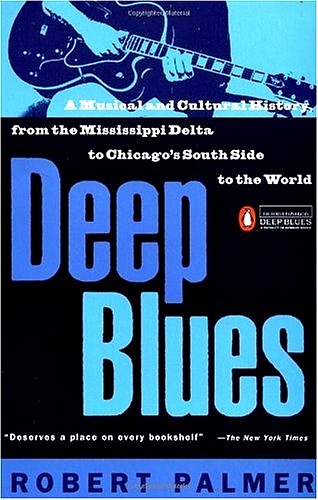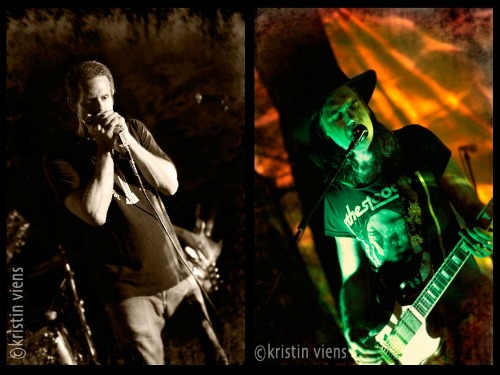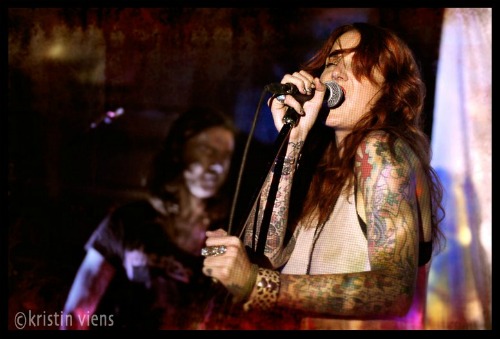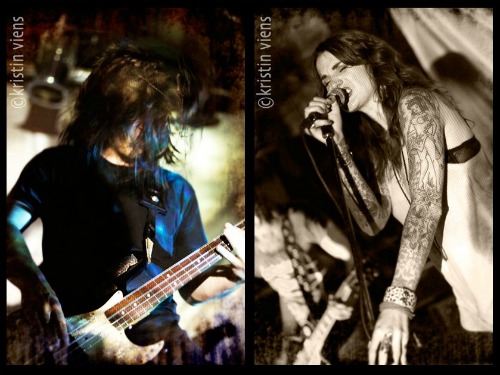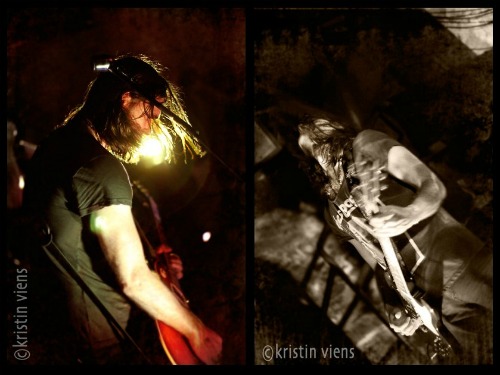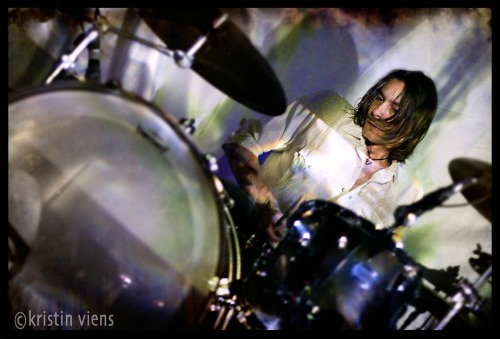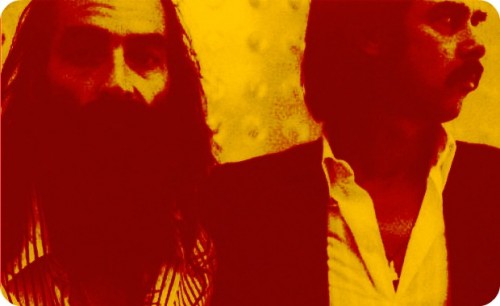Our intrepid reporter has been somewhat delayed by travel and technology, but has continued undaunted. Below is her report from her first show-filled day.
After spending numerous protracted coffee breaks trying to figure out the SXSW schedule, I finally hiked deep into the heart of No-Man’s Land — past the endless blocks of band parking, through a sea of Econoline vans and long-haired skinny-jeaned men lugging instrument cases — to The Echoplex SXSW Throwdown at Red 7. The bill featured a number of up-and-coming Los Angeles bands, but I only had ears for my new musical supercrush: Kan Wakan.
Determined to stake out a spot in front, I arrived early. But I needn’t have worried: Brandon the Swag Man still had a whole table full of free swag and the venue was far below capacity. Only a few hardcore festival-goers lingered in the courtyard, and I ran into singer Kristianne Bautista practically right away. She, too, was recovering from a fever and general travel fatigue, but was excited to meet a new fan. We chatted about her band’s rising fame while they set up, since a seven-piece act needs a little extra preparation.
Unfortunately, that extra work cut into their set time, and they went onstage with room for only four songs: one unreleased tune, the single “Forever Found”, and the two-song suite which closes their EP. And they delivered those four songs with total ease and confidence. It takes some heavy stones to play a twelve-minute orchestral piece in front of a handful of hungover stragglers at an afternoon showcase during a festival, and Kan Wakan simply threw down like it was no big deal. Bautista has an impeccable cool that makes her deep, rich voice roll like an ocean, while her band radiates technical proficiency and casual charisma. Show photographers take note, you will enjoy this band, because every single member is camera-savvy and has unpretentious stage presence.
Short as their set was, it flowed effortlessly and felt perfectly timed, like a miniature release party played live. The sound struck a sweet spot of relaxed intricacy, one that could resonate with serious fans as well as first-time listeners who were riding out a pot-and-alcohol haze. The suite wrapped up on a satisfying note, like a calling card tucked into a hand-picked bouquet, and the band amiably went on to the next gig like it was any other day in their lives. I mentally gave them eighteen months to become front-page famous, twelve-minute instrumental suite and all.
With that excellent start, I set off to Cheer Up Charlie’s, hoping to catch mr. Gnome and Jessica Lea Mayfield in one stop. To my dismay, the schedule had been updated and mr. Gnome’s set bumped up an hour; they were just wrapping up as I arrived.
Luckily Cheer Up’s is probably the most perfect SXSW venue for aimlessly hanging out, so I grabbed a cup of complimentary water and compared schedules with fellow showgoers — one of whom happened to be Nikki Kvarnes of Those Darlins. Jessi “Darlin'” Zazu and Charli XCX also happened by at the same time, so it felt like fate.
During that time, the courtyard slowly filled out until the house stood shoulder-to-shoulder. Those Darlins went on at 4, much to everyone’s delight. They growled and swaggered and laid down countryfied hair-metal-inspired garage rock for a solid forty-five minutes, part of which I spent in line for the restroom. By the time I came back, the cock rock had passed back into male hands and Adrian Barrera had the mic, which just didn’t have the same appeal.
If Those Darlins had a great turnout, Jessica Lea Mayfield did them just a little better, packing the courtyard from edge to edge. I grabbed a spot in front, just in time. She went on at 5, rocking a pair of glittery gold Martens and looking more like a Kurt/Courtney hybrid than Frances Bean currently does. Anyone deceived by Mayfield’s sparkly pink Gretsch and the kitty stickers on her pedals was quickly put right, since she laid immediately into a hard and heavy set. I stood directly in front of her, beside the central speakers, and it became quite clear why she titled her new record Make My Head Sing … : that shit will make you dizzy, in a good way.
The new, toothier treatment might be too strong to suit some of her earlier fans, but I felt it improved tracks from 2011’s Tell Me. Her band during that period was a very capable country-rock ensemble, but her current outfit has leveled up: she’s wisely eliminated a second guitarist and streamlined down to an extremely capable rhythm section, which highlights her own guitar prowess. Though she is clearly aiming for a spot in the neo-grunge pantheon, her voice is so sweetly emotive that she can never quite achieve true deadpan — which is for the better, since she can convey all the simmering resentment and barely-contained restlessness needed to layer her material with more than mere ennui or existential angst. I left impressed, my ears still swimming.
My day ended with back-to-back Doe Paoro shows, first at Banger’s Sausage House for a Dickies’ Roadhouse showcase. The band was sound-checking as I arrived, providing a pre-show teaser for the line forming outside. Although the venue did host Biebs earlier that week, they provided free gourmet sausages and a well-stocked green room trailer for talent, which slightly redeemed their karma. Talent was abundant, as well: after soundcheck, cellist and producer Yuri Hart gushed about crossing paths with Polica‘s Channy Leaneagh.
Despite taking stage while the venue’s barbecue was still heating up, Doe Paoro captivated the gathering dinner crowd. Singer Sonia Krietzer’s nimble vocals, influenced by both R&B and Tibetan opera, were rounded out by Hart on cello and keys, Tatiana Kochkareva on moog and vocoder, David Lizmi (fresh from touring with MS MR) providing bass and additional keyboard, and Chris Berry on both electronic and analog drums. Their sound was big but not overwhelming, fresh but not brassy; Krietzer tends to open shows by beckoning the audience closer, and this group didn’t hesitate. People danced and enthusiastically made iPhone videos, then talked praise after the set.
Because many downtown Austin streets were closed to auto traffic, I grabbed a keyboard case and trekked with the band on foot to the next gig. Although navigating South By Southwest crowds can be a chore even without gear, we managed to arrive at the aptly-named Holy Mountain by sheer force of will (and the people-parting powers of Hart’s cello).
Immediately upon entering the large tented courtyard, my equilibrium shifted. Until the following band mentioned the gig’s strange lighting, I thought I was having an acid flashback. Therefore, my observations of Doe’s set were slightly blue-tinged and wobbly, but I did notice the crowd having a great time; a drunk guy at the rail had an especially good experience and even seemed to know all the words. Krietzer had been worried about the logistics of singing two nearly back-to-back sets, but her voice — and characteristically dynamic stage presence — stood up perfectly to the test. Strange lighting only made it more memorable.
After the set ended, the band packed up, and I caught a licensed photographer sneaking my picture, I decided that “exhausted daze” was a bad look and headed home. The streets were full of more drunk people, most of them venue-hopping, some of them standing in groups to discuss intense interpersonal dramas; the pavement was strewn with empty bottles and discarded flyers, the city’s party not even close to winding down.
A few hours later and a few blocks away, a drunk driver would plow past police and through the traffic barricades into the crowd; four people would lose their lives and dozens more would be injured. But at the time I went home, the boogie was still swinging at full tilt strength and no one knew it would be anyone’s last.
– Joy/@paleotrees





